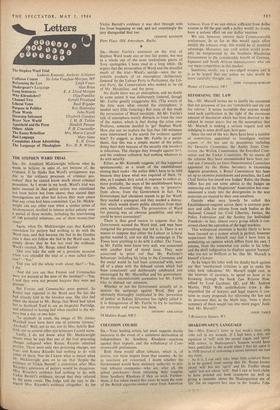Ilh al Letters
The Stephen Ward Trial Ludovic Kennedy, Anthony A rblaster Collision Course Sir John Vaughan-Morgan, MP Reforming the Law Leigh Vance Shakespeare's Laagaage Alan Brien Long Sentences E. A. Lloyd Morgan Why Khrushchev? Olga Franklin Channel Two Gerald Priestland Liberal Votes Basil Wigoder Purpose in Politics Roy Hattersley Plain Words John North Doorstep Salesmen Elizabeth Gundrey Brave New World J. M. H. Tobias Apartheid and the Press Hendrik Pienaar Others Abide P. H. Crassweller The Easter Rebellion Mrs. Maeve Carroll Bad Language Mary Shaw Complaints About Advertising K. H. Grose The Language of Theologians Rev. H. R. Wilson THE STEPHEN WARD TRIAL SIR,—Dr. Amphlett Micklewright believes what he wants to believe; in spite of, not because of, the evidence. If he thinks that Ward's arraignment was due to 'the ordinary processes of criminal pro- cedure' then he cannot know much about criminal procedure. As I wrote in my book, Ward's trial was quite unusual in that police action was stimulated not from below but from above; they started their investigations not after but before they were aware that any crime had been committed. Can Dr. Mickle- wright cite any other case when a similar series of misdemeanors resulted in intense police activity over a period of three months, including the interviewing of 140 potential witnesses, one of them twenty-four tittles?
Again, when Dr. Micklewright says that Keeler's Conviction for perjury had nothing to do with the Ward case, and that because she lied in the Gordon case it does not follow she lied in the Ward case, he simply shows that he has not read the evidence. Ward's counsel, Mr. Burge, asked Keeler: 'Did you take the oath on a previous occasion when you attended the trial of a man called Gor- don?'—'Yes.'
'Did you tell the whole truth about that?'—'Yes, I did.'
'And did you say that Fenton and Commachio were not present at the time of the incident?'—`Yes, I said they were not present because they were not present.'
But Fenton and Commachio were present. So Keeler had repeated in the Ward case the lies she had already told in the Gordon case. She also lied when she denied to Mr. Burge that Ward had taken her to Scotland Yard to see an Inspector Partridge, and admitted to having lied when recalled to the wit- ness box a day or two later.
'To anybody in court, the image of Mr. Justice Marshall must have been one of extreme fairness.' Anybody? Well, not to me, nor to Miss Sybille Bed- ford, nor to several other eye-witnesses I could name.
Lastly, 1 do not know what Dr. Micklewright means when he says that one of the four procuring charges collapsed when Ronna Ricardo admitted Perjury. There were only two procuring charges, not fear, and Ronna Ricardo had nothing to do with either of them. Nor do I know what is meant when Micklewright goes on to say that 'despite the evidence of Vickie Barrett' a conviction after Miss Ricardo's admission of perjury would be dangerous. Miss Ricardo's evidence had nothing to do with Vickie Barrett's evidence, except that they referred to the same count. The Judge told the jury to dis- regard Miss Ricardo's evidence altogether. As for Vickie Barrett's evidence it was shot through with lies from beginning .to end, and not surprisingly the jury disregarded that too.
LUDOVIC KENNEDY
Piers Place, Old A mersham, Bucks.














































 Previous page
Previous page